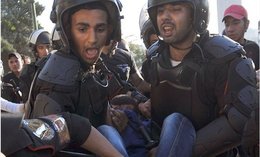Egyptians emerged Thursday from an all-night curfew imposed after the country’s worst violence in decades, with 370 people killed as security forces broke up protests in support of ousted president Mohammad Mursi.
Egyptians emerged Thursday from an all-night curfew imposed after the country's worst violence in decades, with 370 people killed as security forces broke up protests in support of ousted president Mohammad Mursi.
Light traffic returned to the streets after a tense night, following the army-backed interim government's decision to impose a month-long, nationwide state of emergency and curfews in 14 provinces.
The health ministry continued to update its toll, saying at least 327 civilians were killed throughout the country on Wednesday.
That was in addition to 43 police killed in the violence, according to the interior ministry, and put the day's total toll at 370.
Despite the violence, Egypt's press trumpeted the end of the pro-Mursi demonstrations, which had occupied two Cairo squares since the Islamist president's July 3 ouster by the military, following wide protests across the country.
 At least four churches were attacked as police broke up the protests, with Christian activists accusing Mursi loyalists of waging "a war of retaliation against Copts in Egypt".
At least four churches were attacked as police broke up the protests, with Christian activists accusing Mursi loyalists of waging "a war of retaliation against Copts in Egypt".
The Brotherhood remained defiant on Thursday, with spokesman Gehad Al-Haddad saying demonstrations would continue.
"We will always be non-violent and peaceful. We remain strong, defiant and resolved," he tweeted.
"We will push forward until we bring down this military coup."
Mursi loyalists have insisted that their demonstrations are exclusively peaceful, but AFP reported that protesters there were carrying weapons at Rabaa on Wednesday.
The violence prompted vice president Mohammad El-Baradei to resign, saying he was troubled over the loss of life, "particularly as I believe it could have been avoided".
"It has become too difficult to continue bearing responsibility for decisions I do not agree with and whose consequences I fear," he said.
In another context, the Egyptian authorities have closed the Rafah border crossing with the Gaza Strip "indefinitely" for security reasons one day after the police violently ended the protests supporting ousted President Mohammad Mursi, AFP quoted a security official as saying on Thursday.
Hundreds of Palestinian travellers were left stranded on both sides of the crossing, the only gateway into the Palestinian territory, it added.